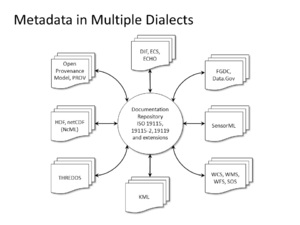Difference between revisions of "Category:Documentation Cluster"
(→Events) |
(→Events) |
||
| Line 26: | Line 26: | ||
:* View [https://youtu.be/drcvrmi3wVc Recording] | :* View [https://youtu.be/drcvrmi3wVc Recording] | ||
:* View [[Documentation Cluster Minutes 2017-01-23|Minutes]] | :* View [[Documentation Cluster Minutes 2017-01-23|Minutes]] | ||
| − | + | :*Feb 27 | |
| + | :* Recording failed | ||
| + | :* View [[Documentation Cluster Minutes 2017-02-27|Minutes]] | ||
*Upcoming: | *Upcoming: | ||
Revision as of 15:21, February 27, 2017
ESIP Vision
“We dissect nature along lines laid down by our native language. Language is not simply a reporting device for experience but a defining framework for it.” Benjamin Lee Whorf
About Us
While Eskimos (and people that live in Colorado) have many words for what others call snow, and surfers have many words for what others call waves, ESIP members have many words for documentation. The goal of the Documentation Cluster is to improve understanding, utilization and integration of all of the dialects shown in Figure 1 and others used in the global environmental community. Equally important, we will work in the spaces between these dialects to build understanding from the similarities and differences between them.
A dialect is a "variety of a language that is a characteristic of a particular group". In the context of data sharing in ESIP, the ways that different groups document their data and products (i.e. metadata standards) are great examples of dialects. They are varieties of the over-arching language of documentation that are used by particular groups in ESIP and other partners in the global environmental community. Figure 1 illustrates this idea with a few commonly used dialects.
The ESIP Community is made up of scientists and informatics experts from a wide variety of disciplines and backgrounds. They come together at ESIP because they realize that they share common needs and hope that they can find others that can help them address those needs. For example, many ESIP members make observations and process them into datasets and products or run models that "predict" data in the past, present, or future. We all want to share those products with a variety of users and, more importantly, we want to make sure those users can discover, use, and understand those products.
The Documentation Cluster is an evolution of the original CF Cluster that was started by Rob Raskin and focused on the Climate-Forecast Conventions that are commonly used by netCDF and related tools. The CF Conventions are an important metadata dialect used by a number of ESIP members and their partners. The Documentation Cluster helps us keep in mind that the CF Conventions are only one of many dialects used by different ESIP groups.
EventsMeeting Agenda and Notes for 2017
Previous Meeting Agendas and Notes: |
Get Involved
|
Activities |
Related Activities (and Other Stuff)see pages below with tagged with Documentation Cluster Category. |
Subcategories
This category has the following 6 subcategories, out of 6 total.
Pages in category "Documentation Cluster"
The following 29 pages are in this category, out of 29 total.
A
- Attribute Convention for Data Discovery
- Attribute Convention for Data Discovery 1-1
- Attribute Convention for Data Discovery 1-3
- Attribute Convention for Data Discovery Future Directions
- Attribute Convention for Data Discovery ISO Translation Notes
- Attribute Convention for Data Discovery Mappings
- Attribute Convention for Data Discovery Object Conventions
- Attribute Convention for Data Discovery Precedence
D
- Documentation Cluster 2016
- Documentation Cluster Meeting Minutes
- Documentation Cluster Minutes 2016-02-22
- Documentation Cluster Minutes 2016-03-28
- Documentation Cluster Minutes 2016-04-25
- Documentation Cluster Minutes 2016-05-23
- Documentation Cluster Minutes 2016-10-24
- Documentation Sessions Winter 2017
Media in category "Documentation Cluster"
This category contains only the following file.
- LI Lineage-2.png 1,800 × 1,350; 197 KB

